Opinion
Flight of butterflies
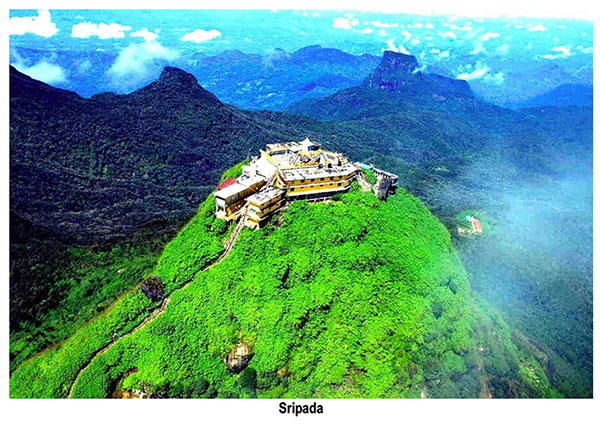
After reading R. Seneviratne’s letter with the above headline referring to my childhood memories on the flight of butterflies towards Sri pada. Last weekend I visited the village where I was born , Meepitiya, two kilometres away from Nawalapitiya, on a family matter, two kilometres, last week-end after nearly 50 years. During my stay of two days, seeing the sacred peak at a distance, my thoughts went back to the letter I wrote to your newspaper, and inquired from my relatives whether these this phenomenon of yellow-coloured butterflies in droves flying during this season, when devotees climb Sripada, still existed. Sadly the reply was negative, as, may be due to clearing of acres of land for the construction of houses denuding the natural vegerttion. We always refer to this peak as Sripada or Adam’s Peak but have forgotten its real name ‘SAMANALAGALA’. Does not this name Samanalagala signify or associate with butterflies making their pilgrimage to this holy peak during the season? In fact in one of the stanzas in the Selalihini Sandeshaya, by Ven. Thotagamuwe Sri Rahula, reads – Saki sanda pene Samanala Gala Negenahira– (In the east behold Samanala Gala).
Incidentally, I consider myself fortunate to view this sacred peak Samanalagala from my home here in Boralesgamuwa, bordering the jogging track and the Bellanwila lake.
Although I did not see yellow butterflies flying towards Samanalagala, that disappointment was amply compensated when I visited the village temple where I saw a newly painted statue of Buddha. One unique feature was the compassionate, benevolent smile which I have not seen elsewhere, in a statue of the Buddha.
G. A. D. Sirimal
BORALESGAMUWA
Opinion
Degree is not a title!

A degree (B.A., M.Sc. or Ph.D.) awarded by a university or other organisation, with adequate authority, is a university degree, not a title like Mudali or Duchess of Kent. These latter titles are awarded by a king/queen or a government and may be revoked; degrees awarded by universities cannot be revoked unless there was malfeasance in the award of the degree. The learned physician who identified a Ph.D. degree as a title (The Island, 13/12/24) was wrong. The cardiologist had missed the heart of the matter.
What is the heart of the matter? The degree comes from Latin gradus meaning a step; a step in the progress of a university student. Why a Doctor of Philosophy (Ph.D.)? Because, in Latin it is doctor philosophiae and that is why Oxford University awards a D.Phil. degree. Most other universities use the form of Ph.D. But why Latin? Because where universities were founded, the language of learning (and much else) was Latin. The term university comes from universitas vestra, (You all) which was used in Bulls issued by a Pope to address a group (students or masters) who sought a charter from him to establish a university e.g. St. Andrews in Scotland in 1413. To understand why that procedure, one has to learn about feudal Europe.
But why does a person who studies medicine receive a D.Phil. degree (e.g. the eminent professor Tashi Chang at Colombo)? Go back to the history of universities in Europe. In those universities, there were only 5 faculties of study: arts, law, theology, medicine and philosophy. Note that there was no science faculty. There were grades, in the sense gradus. The lowest was the arts faculty; every student had to graduate from that faculty.
They often referred to the other four as ‘superior faculties’. You still get a B.A. degree in engineering (in Cambridge) or in history at Peradeniya; it is the first step in one’s academic journey. If one continues one’s studies, one may earn a Master’s Degree (M.A.) in the arts faculty. It was a degree essential for anyone to teach in a university. With an M.A. degree, one became a docent who could teach in any university or its predecessor studium generale(e.g.Montpellier) anywhere, provided one had attended the prescribed lectures and successfully engaged in disputation (disputandum). The term ‘docent’ is still used in Europe: France, Germany and Poland.
A student may proceed to a superior faculty. They could study law (either canon or civil), medicine, theology, or philosophy. In rank, the faculty of philosophy was superior to all others and the degree from that faculty still remains the highest degree that a student may earn from a university. Someone who satisfies the requirements at MIT receives a Ph.D. degree. (Still higher degrees (e.g. D.Lit., D.C.L, D.Sc. are awarded for outstanding academic achievement as judged by the university.) Non-university institutions may elect such distinguished men and women as Fellows of the Royal Society or of the British Academy in England. This process has been kept intact in most universities in US. To proceed to a Ph.D. degree in whatever discipline, it is necessary to have obtained a good (grade point average) B.A. degree or an M.A. degree. In addition, they need to do well in the respective entrance examinations: MCAT for medical schools or GMAT for business schools.
The old procedure of disputations in public is a requirement for the award of a Ph.D. In both the US and most universities in Europe. (In old Europe, before written examinations were introduced, the other requirement that a student had to satisfy, was that he had attended classes where prescribed books were read in a lecture. In pre-Gutenberg Europe, books were rare and expensive and had to be listened to when read by a lecturer. Are we in Sri Lanka still there?) Hence university lecturers. In most other universities today, that disputation takes place in the viva voce examination of the thesis of a candidate for a higher degree.
It is unfortunate that in our society most people find a degree a TITLE: something to display. A Ph.D. or D.Phil. Degree is only a gradus, the terminal step for a student in a university.
Philosophiae Doctor
(Canterbrigensis)
Opinion
Towards building a prosperous future

Sri Lanka witnessed two pivotal elections—presidential and parliamentary—in 2024, resulting in the formation of a new government with unprecedented strength, following years of political turmoil and economic bankruptcy. President Anura Kumara Dissanayake’s speeches thus far demonstrate a clear understanding of the gravity of their victory and the urgent need to deliver relief to the people. This new administration had promised change and reform during the campaign, and now, in power, they must act swiftly to meet the nation’s high expectations.
The significant increase in voter support, seen in the high rise in votes between the two elections, reflects the people’s growing trust in the President and his team. Measures such as the President’s unpretentious demeanor and genuine simplicity have resonated strongly with the public, earning him swift popularity. His statement, “I am not a magician, so do not expect results instantly” struck a chord with the people, illustrating his realistic approach. This sentiment was further echoed in the Parliamentary elections, and the parties that had unjustly blamed the President for the rising cost of basic goods such as coconut, were soundly rejected.
With the appointment of the Cabinet of Ministers and the commencement of Parliamentary sessions, the government is now tasked with delivering on its pre-election promises while managing the high expectations of the public. However, despite the overwhelming electoral support, fulfilling these promises presents significant challenges as they involve complex considerations including financial constraints and the agreement with, the International Monetary Fund (IMF). A careful and strategic approach to budgeting and resource allocation is essential for the government to manage these demands effectively. The numerous requests from influential groups, unions, and individuals—ranging from vehicle imports and the absorption of Development Assistants as teachers to the reduction of electricity tariffs—require substantial funding. Addressing these pressures will need prudent prioritisation and professional decision-making. Furthermore, the Provincial Council and Local Government elections expected within the next few months may influence the government’s political standing, making it essential to balance political realities with economic feasibility.
Historically, Sri Lankan governments have relied on promising doles and subsidies to secure votes, fostering a culture of dependency among the electorate. This long-standing practice has led many citizens to expect government assistance as a right, often without fully recognising that these services are funded by taxpayers. To meet public expectations without exacerbating the fiscal deficit, the government faces the uncomfortable truth that increasing public services often requires raising taxes, which in turn reduces the disposable income of citizens. The NPP government now confronts this challenge, having promised extensive benefits during the campaign, with voters now eagerly awaiting their fulfillment. A key issue here is the prevailing mentality of dependency, which must be addressed through public awareness campaigns. Citizens need to understand that for the nation to thrive, there must be a shift from a recipient mindset to one of productivity and contribution. Fostering a culture of work, innovation, and increased productivity is essential for improving both individual and national income.
Without increasing national productivity, sustainable economic improvement is unattainable. Borrowing for consumption, and repaying those loans, only exacerbates the economic crisis, leading to an unsustainable debt burden. By 2024, Sri Lanka’s national debt has grown despite efforts to repay loans following the 2022 economic crisis, underscoring the need for a more sustainable approach.
As a nation, we must collectively work towards enhancing productivity in all sectors. When doing so we shall not reject progressive measures such as the introduction of finger-print machines at workplaces to monitor the employees’ attendance (The National Audit Office revealed recently that 213 fingerprint machines that were purchased for LKR 31 million are not in use since 2017 due to the pressure by a Trade Union in a particular ministry). Working together as one team with commitment will not only increase productivity and national income but also create opportunities for investment and improved quality of life. To encourage this shift, changing the public mindset is crucial. This involves creating visible, tangible changes in the environment, with one area offering significant potential for impact being the road safety.
Sri Lanka’s road network is plagued by frequent accidents, causing injury, loss of 8 lives a day on average, and significant financial drain through medical costs and vehicle repairs. A collective effort to change the attitudes of drivers, passengers, and pedestrians towards polite, law-abiding behaviour can dramatically reduce these incidents. By adhering to traffic rules and fostering a culture of safety, the roads could become a safer, more peaceful space, reflecting the broader societal transformation the country is undergoing. This shift could serve as a powerful symbol of and a motivational factor for the system change the new government is aiming at. Like the paintings created by the youth when Gotabaya Rajapakse became the President, the road traffic behaviour can be improved to signify the Sri Lanka’s change in the governance.
In such a move, peace-loving citizens, the Police, the Automobile Association of Sri Lanka, civic organizations, and the media can join forces and launch a sustained national campaign to promote road safety through adherence to traffic regulations. This campaign could catalyze broader societal changes, beginning with safer roads and extending to workplace behaviour. Through such collective action and a shared commitment to change, Sri Lanka can achieve the tangible results of its new governance and sustainably work towards a prosperous future.
TILAK W. KARUNARATNE
Kottawa
Opinion
Independent verification of MPs’ academic and professional qualifications, etc.

There is a big noise about the qualifications of the Speaker of the Parliament of Sri Lanka. Subsequently, the Speaker resigned from his position on 13 December 2024. We as taxpayers, expect that it is necessary for the MPs to be honest and exemplary in their public disclosures as representatives of the people. Further, they need to set an example on their integrity, transparency, and accountability.
Therefore, I suggest that there should be an independent verification process carried by the Auditor-General on some vital information about the Parliamentary MPs, Opposition Leader, Prime Minister, and President. It is necessary that the following basic information to be verified by the Auditor-General, after the parliamentary elections.
Academic and professional qualifications of the MPs
Wealth declarations of the MPs
Tax file number and past tax returns and payments of the MPs including their spouses and children.
There should be a legislation making it compulsory to declare the above information by the MPs. There should be provisions in that legislation to expel and prosecute the MPs, who provide bogus information as publicity stunts and to deceive the public.
SUNIL DAHANAYAKE
University Academic and Chartered Accountant
-

 Business6 days ago
Business6 days agoLaunching in Kandy of SL’s first seven-star hotel, valued at Rs. 9 billion
-
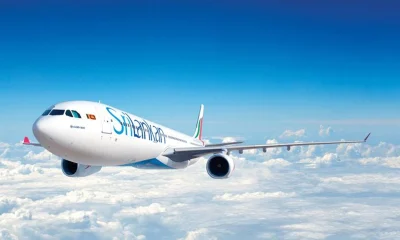
 Opinion5 days ago
Opinion5 days agoFuture of SriLankan
-
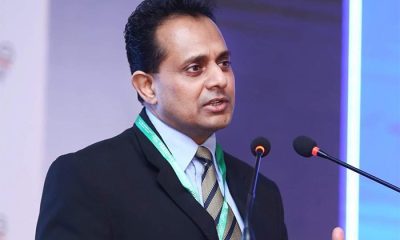
 Business6 days ago
Business6 days agoSri Lankan appointed Vice President, Global Rural Tourism Council
-

 News6 days ago
News6 days agoCourt to be moved against Ranil over loss of state funds
-

 Editorial6 days ago
Editorial6 days agoPolitics and doctoral embellishments
-

 Sports5 days ago
Sports5 days agoJayasuriya backs Kamindu Mendis
-
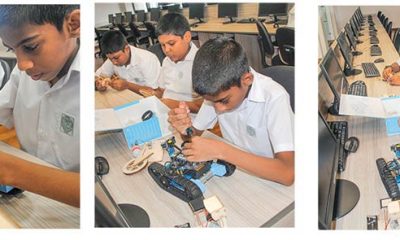
 Features3 days ago
Features3 days agoEmpowering the next generation: St. Benedict’s College brings STEM education to life
-
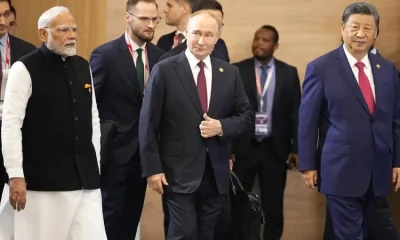
 Features5 days ago
Features5 days agoBRICS and De-Dollarization: Implications for India and Global Power Dynamics











